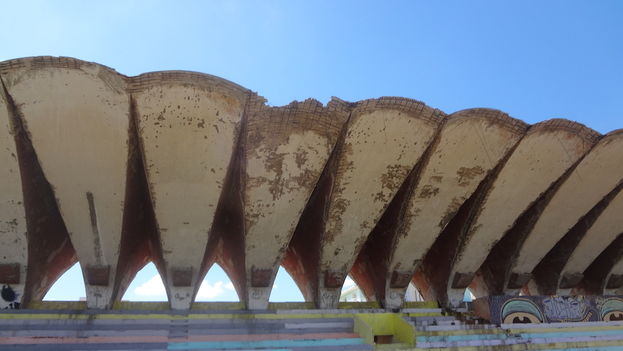
![]() 14ymedio, Marcelo Hernandez, Havana, 24 March 2017 — The José Martí Sports Park, on the Havana Malecon, is benefitting from major repairs, albeit with several years of delay. The iconic installation, which for decades has fascinated photographers with its peculiar mixture of ruins and beauty, is filled these days with construction workers.
14ymedio, Marcelo Hernandez, Havana, 24 March 2017 — The José Martí Sports Park, on the Havana Malecon, is benefitting from major repairs, albeit with several years of delay. The iconic installation, which for decades has fascinated photographers with its peculiar mixture of ruins and beauty, is filled these days with construction workers.
The sports area was converted into a dormitory for homeless people, a zone of sexual tolerance and an area of danger in the face of the threat of collapse. Its decadent esplanade, subjected to salt air and apathy that shredded the exterior wall, continued to be visited by runners who wanted to lose a few pounds, kids ‘in training’ and people walking their dogs.
Opened in the 1940s, the park was remodeled in 1960 by the Cuban architect Octavio Buigas and at that time had a gym, swimming pool, stadium, parking, children’s play area, a basketball and volleyball court which had tiered seating for more than 1,000 spectators.
The stadium, from where one could enjoy sports competitions and the spectacle of the sea at the same time, had stands for 3,150 spectators, and provided a light shelter in the form of a vault that became a landmark identified with the Cuban capital city.
On the occasion of the 1991 Pan-American Games, partial repairs were made to be able to hold the handball matches there, but at the end of the competitions, no attention was paid to the place. There was a project to “stop the deterioration” that never got beyond minor masonry work.
The damage became so deep and widespread that in 2000 the authorities decided to close the facility, because it was considered a danger to life
The damage became so deep and widespread that in 2000 the authorities decided to close the facility. A technical report from the Directorate of Hygiene and Epidemiology of Public Health, in collaboration with the Directorate of Construction and Real Estate Repair, decreed that the installation constituted a danger to life.
The most serious problems included the accumulation of water in the roof of the stands, the collapse of the diving platforms and the vandalism of the windows. Those who slipped through any hole to perform exercises were dealt with by the custodians. Without success.
At the end of last year, two racquetball courts, the karate practice ground and the handball, volleyball and outdoor basketball courts were repaired, but no progress was made in the more complex areas.
This time the repairs aim to go further and demolish the emblematic roofs of the stadium, a task assigned to Specialized Construction Services (SECONS) under the direction of Constructora Caribe. The athletic locker rooms, bathrooms and cafeteria located underneath will be completely renovated.
Those responsible for the work have told the official media that one of the first actions will be the rebuild the perimeter fence. Instead of the reinforced concrete there will be reinforced polymers that are resistant to corrosion and that offer less resistance to the inevitable waves from the sea.
Only when the area is protected will the track and field area begin to be remodeled. The swimming and diving pools will have to wait until next year.
